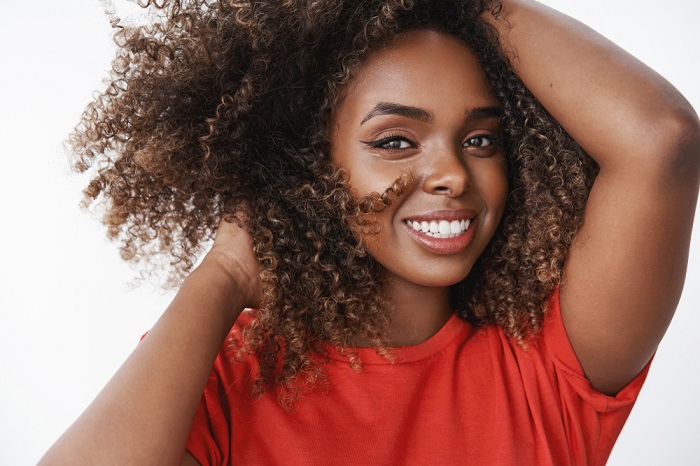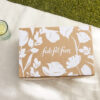
The sea of skincare is a tricky one to navigate — each time you think you’ve sailed through a rough patch with your skin, a new problem bubbles up — whether it’s chapped skin or pesky breakouts.
While the waters may be rough, zinc is an effective first mate as you cross an expanse of blemishes, dark spots, and scars.
But what does zinc do for skin, exactly? This helpful guide will act as your compass to steer you through zinc’s many benefits that help your skin cascade with shine.
#1 Zinc May Have Anti-Inflammatory Properties
Many of your skin’s biggest problems are caused by or related to inflammation — your body’s response to invaders, like bacteria and viruses, that can harm your health.1 Your immune system responds to these invaders by sending out white blood cells to attack the intruder and heal any resulting damage.
Some inflammation is good — it means your body can respond to and protect against infection. However, too much inflammation can lead to a host of health problems, including skin issues.
Zinc can help alleviate some of the redness, swelling, and discoloration that appears in your skin because of inflammation.
Some skin issues related to inflammation that zinc may help relieve include:2
- Acne – If you’ve suffered from the painful blemishes caused by acne, you know that they’re difficult to get rid of. Furthermore, acne can leave behind lasting scars. Zinc has been shown to help manage the swelling and redness caused by acne flare-ups. And it may also help reduce acne scars.
- Eczema – Zinc may also help ease some of the symptoms of eczema, helping to control some of the uncomfortable itching.
- Rosacea – Rosacea is a common condition that makes your face appear visibly flushed. Zinc’s ability to help even skin tone may help manage the redness that accompanies a rosacea flare-up.
- Dermatitis – One of the earliest signs of a zinc deficiency is often painful, itchy skin. The appearance of dermatitis might be a sign that you’re lacking zinc in your diet. Adding more zinc to your routine can help control inflammatory skin disorders and provide relief from itching.
#2 Zinc May Help Wounds Heal
Both topically applied and orally consumed zinc may help wounds heal more quickly. Zinc plays an important role in the production of key components of the body’s healing process, and it may help reduce the appearance of scars afterward.3 This happens for two reasons:
- Collagen production – Zinc helps stimulate the production of collagen. Collagen is an essential protein found in your skin, bones, tendons, and cartilage. It’s involved in the repair and maintenance of these tissues. When your body suffers from an injury, collagen is necessary in healing and repair processes. Even older scars can benefit from the application of zinc.
- Cell reproduction – Zinc also plays a critical role in cell reproduction. New cells are a must when your body needs to repair existing damage. Applying a zinc-rich ointment to a cut may increase the rate at which the wound shrinks and heals.
#3 Zinc Has a Strong Relationship to Anti-Aging
Zinc’s healing properties may also make it a powerful soldier in the battle against the signs of aging. Aging shows itself in many different ways on your skin, including:4
- Wrinkles
- Fine lines
- Age spots
- Dryness
- Redness
As such, using zinc can help with these issues in two key ways:
- Zinc may help reduce the appearance of age-related spots – Zinc plays a role in suppressing the overproduction of pigment cells that cause age spots. It can also help reduce the appearance of existing age spots and give your skin a more even tone.
- Zinc might help prevent signs of aging – The stimulation of collagen production that zinc encourages may help give your skin a more youthful glow. Collagen firms and plumps your skin, which may help smooth out those wrinkles and fine lines.
#4 Zinc Provides Strong Sun Protection
Shielding your skin from the harmful effects of the sun mitigates signs of aging and helps protect your skin against damage.
Zinc sunscreens have been around for decades and are innovative sunscreens. Zinc is found in many sunscreen products and works to block the sun’s rays from reaching your skin. These sunscreens are often referred to as physical sunscreens because they don’t absorb into the skin.5 Instead, zinc sunscreens stay on top of the skin, creating a physical barrier between the damaging rays and your skin, which can help protect you from certain skin cancers.
Using a sunscreen that contains zinc oxide also helps protect your skin from visible signs of aging. Along with harmful skin cancers, the sun’s rays can also exacerbate the appearance of aging skin. Sun exposure can cause:
- Wrinkling
- Dark spots
- Redness and uneven skin tone
The UVA and UVB rays in the sun aren’t your friends in any situation. That summer tan that you think is healthy is actually a sign of significant skin damage. Applying a strong sunscreen every day is one of the best things you can do to protect against those harmful UV rays for your skin’s health.
How Should You Use Zinc?
Zinc is an essential mineral in critical body functions, such as:
- Immune system regulation
- Protein synthesis
- Cellular growth and repair
- Proper ability to smell and taste
As such, you should consume a sufficient amount of zinc in your diet for optimal health. You can also reap some of the skin-boosting benefits of zinc when it’s applied topically.
Zinc in Your Diet
The most important way to get zinc is through your diet. The National Institutes of Health recommends that adults consume between 8 to 11 mg of zinc per day.6 Sources of dietary zinc include:
- Oysters
- Crab
- Lobster
- Poultry
- Red meat
- Fortified cereal
- Nuts
- Beans
- Whole grains
- Some dairy products
Some people, especially vegetarians, vegans, and those with gastrointestinal diseases, may struggle to consume sufficient amounts of dietary zinc. As such, it’s essential for those not receiving enough zinc in their diet to take a dietary zinc supplement.
Zinc in Supplements
If you cannot get enough zinc through your diet, you may need to take a supplement. Oral zinc supplements are typically sold as:
- Capsules
- Multi-vitamins
- Powders
Many skin conditions or concerns can be related to your gut and immune function. Increasing your zinc intake through food or an oral zinc supplement can also promote healthy skin by taking care of your body within. If you think you’re coming up short in dietary zinc, you may want to speak with your doctor about the best zinc supplementation for your health needs.
Zinc in Skin Care Products
Lastly, zinc is often found in other skincare products besides zinc oxide sunscreen, and is one of the key beauty ingredients to include. Both topical and dietary zinc can be beneficial for skin health. Topical zinc-rich products can include:
- Make-up
- Lotions
- Creams
- Powders
- Ointments
The best zinc products to use for your skin depend on what you want to use them for. Ointments and creams are often used to assist with wound healing, and sunscreen lotions are ideal for sun protection.
What is Zinc, Exactly?
In its natural form, zinc is a metal found deep within the earth’s surface. There are two different forms of zinc found in skincare products: zinc oxide and non-nano zinc oxide.7 The forms differ in the size of zinc particles.
Non-nano zinc oxide has larger zinc particles and is typically used in sun protection products. This is why you sometimes get the white residue that’s left behind when you use zinc-based sunscreen.
Zinc oxide contains smaller particles that blend more readily into the skin when applied topically. Powdery zinc oxide is the type most often used in makeup, lotions, creams, and other skincare products.
Are There Any Risks Associated with Zinc?
If you get too much zinc in your diet, you can experience some health issues. For adults, more than 40 mg of zinc per day can cause:6
- Nausea
- Weight loss
- Vomiting
- Diarrhea
- Stomach cramps
- Headaches
An overabundance of dietary zinc may also cause your immune system to weaken and your levels of “good” cholesterol to drop.
Zinc can also interact with certain medications. As such, you should always speak with your doctor about any medications you’re taking before adding zinc to your routine.
Boost Your Skincare Routine with FabFitFun
There are many zinc benefits for skin — this mineral can help heal, protect, and enhance your skin’s appearance. And you can add it to your skincare routine in a variety of ways — including through FabFitFun’s subscription boxes.
Every season, you’ll be sent a collection of beauty and lifestyle products to your door. Whether you’re in need of acne treatment, hair styling creams, or serums to minimize pores, you’ll be introduced to new products and brands. When you become a member, you’ll also have access to exclusive sales, beauty advice, and more. Infuse your life with beauty by joining FabFitFun today.
Sources:
- PubMed. What is Inflammation? https://www.ncbi.nlm.nih.gov/books/NBK279298/
- PubMed. Zinc Therapy in Dermatology. https://www.ncbi.nlm.nih.gov/pmc/articles/PMC4120804/
- PubMed. Studies on Zinc in Wound Healing. https://pubmed.ncbi.nlm.nih.gov/2275309/
- National Institute on Aging. Skin Care and Aging. https://www.nia.nih.gov/health/skin-care-and-aging
- Environmental Working Group. Nanoparticles in Sunscreen. https://www.ewg.org/sunscreen/report/nanoparticles-in-sunscreen/
- NIH. Zinc. https://ods.od.nih.gov/factsheets/Zinc-Consumer/
- Chemical Safety Facts. Zinc Oxide. https://www.chemicalsafetyfacts.org/zinc-oxide/




